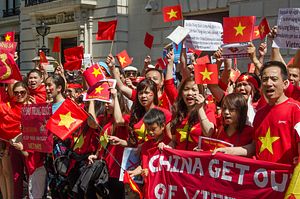At the 2013 Shangri-La Dialogue, one of the most substantive security dialogues in Asia, Vietnam’s Prime Minister Nguyen Tan Dung gave his keynote address on “Cooperation and Prosperity in the Asia-Pacific Region.” During the speech he said that, to have peace, development and prosperity, building and consolidating strategic trust is essential. I would argue that China, one of Vietnam’s closest partners, has relinquished this goodwill by losing Vietnam’s strategic trust and put Vietnam in a bind between protecting its territorial sovereignty and maintaining the status quo of its foreign policy.
From Strategic Trust
During his keynote address, Dung quoted a common Vietnamese saying, “if trust is lost, all is lost.” Trust, in his definition, is the beginning of all friendships and cooperation; the remedy that works to prevent calculations that could risk conflicts. Trust must be treasured and nurtured constantly by concrete, consistent actions in accordance with common norms and with a sincere attitude. To build strategic trust, nations need to abide by international law, uphold national responsibilities (especially of major powers), and work to improve the efficiency of multilateral security cooperation mechanisms. Working together to build and reinforce strategic trust for peace, cooperation and prosperity in the region is in the shared interest of all countries.
Oil Rig Deployment
Vietnam and China are neighbors that have a long and complex relationship. Though they have had disputes and conflicts, they have also expanded commerce and political ties through their communist parties and governments. During his official visit to Vietnam in October 2013, Chinese Premier Li Keqiang and Vietnamese leaders agreed to handle outstanding disputes in a proper way and prevent them from steering the Sino-Vietnamese relationship away from a harmonious course. Li also called on the two sides to refrain from unilateral moves that would escalate the South China Sea issue and cause unnecessary troubles in bilateral cooperation. For its part, Vietnam maintained this agreement and regarded China as a reliable and strategic partner.
However seven months later, on May 2, 2014, China unexpectedly and unilaterally deployed its state-owned oil rig HD-981 inside Vietnam’s Exclusive Economic Zone without prior permission. This action, as Professor Carl Thayer pointed out in his article in The Diplomat, was unexpected, provocative and illegal. China’s act seriously violated Vietnam’s sovereignty and the agreements between leaders of both countries, as well as infringing upon international law: the U.N. Convention on the Law of the Sea (UNCLOS) 1982 and the Declaration on the Conduct (DOC) of Parties in the South China Sea. Consequently, China has turned its disputes in the South China Sea into some of the most serious sovereignty issues in recent years. (Although it did in fact remove the oil rig from the disputed waters near the Paracel Islands late Tuesday.)
Vietnam’s Dilemma
Vietnam thus faces a dilemma. Many scholars have urged Hanoi to either react assertively with China, or change its foreign policy to effectively deal with Beijing’s increasingly aggressive attitude. In his article in The Diplomat, Dr. Nguyen Manh Hung, Associate Professor of Government and International Relations at George Mason University, suggested Vietnamese leaders have to face the fact that ideological affiliation and socialist brotherhood have failed to prevent China from encroaching on Vietnam’s sovereignty and territorial integrity. While Vietnam’s territorial integrity is being violated by China, three other permanent members of the UN Security Council that are Vietnam’s strategic partners – France, the U.K., and Russia – give it only lukewarm support. Surprisingly, the strongest support for Vietnam has come from the U.S., a comprehensive, but not strategic, partner of Vietnam, Dr. Hung noted.
Although relations between Vietnam and the U.S. have progressed rapidly and comprehensively since normalization in 1995, there are still some obstacles to overcome, such as human right issues. Problems, which may include differences in the interpretation and practice of human rights, religious freedom, and the course of democratization, need more attention if they are to be resolved. Though they stem from the fact that the two countries have different political systems, they not only impede the present relationship to a certain extent, but also constitute a potential source of tension for the future. Washington’s management of its relationship with China also has a significant impact on Vietnam. Vietnam is naturally sensitive to relations between these powers, and has to walk a fine line between Beijing and Washington.
Naturally Vietnam wishes to build strategic trust with the U.S., China, and all other nations. Throughout its thousands of years of history, Vietnam has suffered numerous losses due to wars. However, as Dung observed at the Shangri-La Dialogue, to have a genuine and lasting peace, the independence and sovereignty of any country, whether large or small, must be respected, while differences in interests, culture, and other aspects must be subject to open and constructive dialogues of mutual understanding and mutual respect. This goodwill has to be encouraged by all countries, including those that are considered strategic partners with Vietnam.
Nguyen Huu Tuc is a postgraduate student at the S. Rajaratnam School of International Studies – RSIS, Singapore. The views expressed in this article are his own.
































